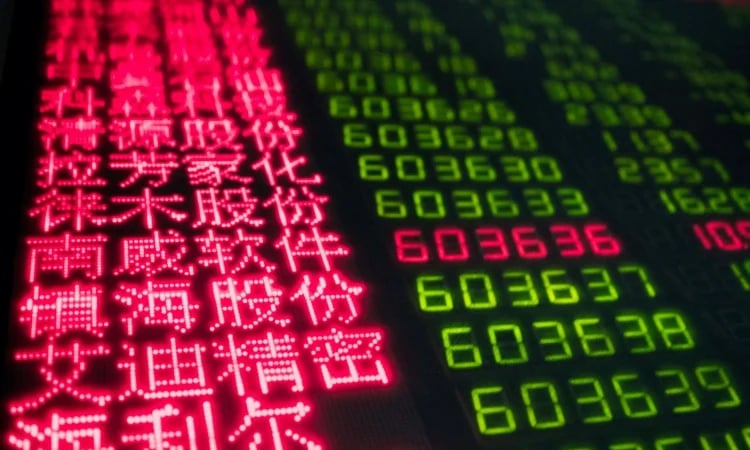News Flash

HONG KONG, April 7, 2025 (BSS/AFP) - Asian and European equities collapsed on a black Monday for markets after China hammered the United States with its own hefty tariffs, ramping up a trade war many fear could spark a recession.
Trading floors were overcome by a wave of selling as investors fled to the hills, with Hong Kong's loss of 13 percent its worst in nearly three decades, while Frankfurt dived 10 percent, Taipei 9.7 percent and Tokyo almost eight percent.
Futures for Wall Street's markets were also taking another drubbing, while commodities slumped.
US President Donald Trump sparked a market meltdown last week when he unveiled sweeping tariffs against US trading partners for what he said was years of being ripped off and claimed that governments were lining up to cut deals with Washington.
But after Asian markets closed on Friday, China said it would impose retaliatory levies of 34 percent on all US goods from April 10.
Beijing also imposed export controls on seven rare earth elements, including gadolinium -- commonly used in MRIs -- and yttrium, utilised in consumer electronics.
On Sunday, vice commerce minister Ling Ji told representatives of US firms its tariffs "firmly protect the legitimate rights and interests of enterprises, including American companies".
Hopes that the US president would rethink his policy in light of the turmoil were dashed Sunday when he said he would not make a deal with other countries unless trade deficits were solved.
"Sometimes you have to take medicine to fix something," he said of the ructions that have wiped trillions of dollars off company valuations.
- No sector spared -
The savage selling in Asia was across the board, with no sector unharmed -- tech firms, car makers, banks, casinos and energy firms all felt the pain as investors abandoned riskier assets.
Among the biggest losers, Chinese ecommerce titans Alibaba tanked more than 17 percent and rival JD.com shed 14 percent, while Japanese tech investment giant SoftBank dived more than 11 percent and Sony gave up nine percent.
Hong Kong's 13 percent loss marked its worst day since October 1997 during the Asian financial crisis, while Frankfurt plunged 10 percent.
Shanghai shed more than seven percent, with China's state-backed fund Central Huijin Investment vowing to help ensure "stable operations" of the market.
Singapore plunged nearly eight percent, while Seoul gave up more than five percent, triggering a so-called sidecar mechanism -- for the first time in eight months -- that briefly halted some trading.
Sydney, Wellington, Manila and Mumbai were also deep in the red, while London and Paris both dropped more than six percent at the open.
"We could see a recession happen very quickly in the US, and it could last through the year or so, it could be rather lengthy," said Steve Cochrane, chief Asia-Pacific economist at Moody's Analytics.
"If there's a recession in the US, of course, China will feel it as well because demand for its goods will be hit even harder," he added.
Concerns about demand saw oil prices sink more than three percent at one point Monday, having dropped around seven percent Friday. Both main contracts are now sitting at their lowest levels since 2021.
Copper -- a vital component for energy storage, electric vehicles, solar panels and wind turbines -- also extended losses.
- Carnage on Wall Street -
The losses followed another day of carnage on Wall Street on Friday, where all three main indexes fell almost six percent.
"Over Thursday and Friday, the S&P 500 fell by a massive 10.53 percent in total, making it the fifth-worst two-day performance since World War Two," said analysts at Deutsche Bank.
"Indeed, the only other times we've seen a double-digit loss over two sessions were during Covid-19, the height of the (global financial crisis), and Black Monday 1987."
That showing came after Federal Reserve boss Jerome Powell said US tariffs will likely cause inflation to rise and growth to slow, and warned of an "elevated" risk of higher unemployment.
"Powell's hands are tied," said Stephen Innes at SPI Asset Management. "He's acknowledged the obvious -- that tariffs are inflationary and recessionary -- but he's not signalling a rescue."
While Powell has so far refused to announce any rate cuts, markets are betting he will do soon.
- Key figures around 0715 GMT -
Tokyo - Nikkei 225: DOWN 7.8 percent at 31,136.58 (close)
Hong Kong - Hang Seng Index: DOWN 12.4 percent at 20,012.03
Shanghai - Composite: DOWN 7.3 percent at 3,096.58 (close)
London - FTSE 100: DOWN 5.6 percent at 7,604.63
West Texas Intermediate: DOWN 3.6 percent at $59.76 per barrel
Brent North Sea Crude: DOWN 3.4 percent at $63.33 per barrel
Dollar/yen: DOWN at 145.32 yen from 146.98 yen on Friday
Euro/dollar: UP at $1.1038 from $1.0962
Pound/dollar: UP at $1.2925 from $1.2893
Euro/pound: UP at 85.40 pence from 85.01 pence
New York - Dow: DOWN 5.5 percent at 38,314.86 (close)